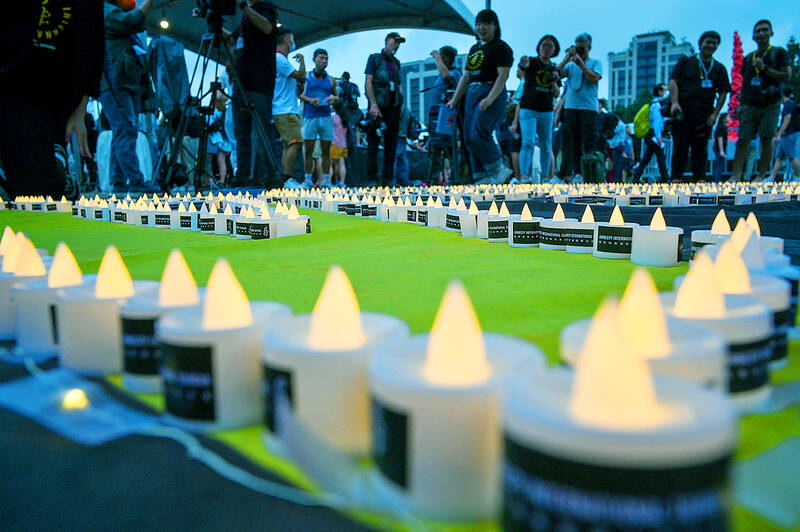An annual vigil was held in Taipei yesterday to remember the victims of a violent crackdown on pro-democracy demonstrators by Chinese authorities in Beijing 34 years ago on June 4.
The vigil, which began at 6:40pm at the Chiang Kai-shek Memorial Hall, included remarks by Taiwanese and foreign human rights campaigners, exiled Hong Kong protesters and politicians, and Taiwanese lawmakers.
Wu Renhua (吳仁華), a Chinese academic and participant in the Tiananmen Square demonstrations of 1989, opened the proceedings by lamenting the lack of a commemoration of the crackdown in the Chinese-speaking world outside of Taiwan.

Photo: AFP
He said that pro-democracy groups in Hong Kong had previously held large-scale vigils in Victoria Park every year on June 4 to remember the victims of Tiananmen Square, but Hong Kong authorities banned the event in 2020, citing COVID-19 concerns.
Since then, they have closed the venue to demonstrators in the name of epidemic prevention, and more recently to prevent “illegal activities” under its National Security Law.
Taiwan is the sole country in the Chinese-speaking world that can publicly commemorate the Tiananmen Square Massacre, Wu said.
As a witness and survivor of the massacre, Wu said he has participated in the annual vigil in Taipei for five consecutive years, and more people seem to be joining the annual memorial.
Although Taiwan has no official diplomatic relations with China, it should commemorate the 1989 incident, because as a democratic country, it should demonstrate its respect for universal human rights, he said.
“Human rights are without borders,” he said.
New School for Democracy chairman Tseng Chien-yuan (曾建元), who organized the vigil, said that the Tiananmen Square Massacre is something that Taiwan definitely needs to commemorate every year.
The same Chinese Communist Party regime that brutally cracked down on its people in 1989 is now sending warplanes and ships into Taiwan’s vicinity every day, he said.

Alain Robert, known as the "French Spider-Man," praised Alex Honnold as exceptionally well-prepared after the US climber completed a free solo ascent of Taipei 101 yesterday. Robert said Honnold's ascent of the 508m-tall skyscraper in just more than one-and-a-half hours without using safety ropes or equipment was a remarkable achievement. "This is my life," he said in an interview conducted in French, adding that he liked the feeling of being "on the edge of danger." The 63-year-old Frenchman climbed Taipei 101 using ropes in December 2004, taking about four hours to reach the top. On a one-to-10 scale of difficulty, Robert said Taipei 101

Nipah virus infection is to be officially listed as a category 5 notifiable infectious disease in Taiwan in March, while clinical treatment guidelines are being formulated, the Centers for Disease Control (CDC) said yesterday. With Nipah infections being reported in other countries and considering its relatively high fatality rate, the centers on Jan. 16 announced that it would be listed as a notifiable infectious disease to bolster the nation’s systematic early warning system and increase public awareness, the CDC said. Bangladesh reported four fatal cases last year in separate districts, with three linked to raw date palm sap consumption, CDC Epidemic Intelligence

Two Taiwanese prosecutors were questioned by Chinese security personnel at their hotel during a trip to China’s Henan Province this month, the Mainland Affairs Council (MAC) said yesterday. The officers had personal information on the prosecutors, including “when they were assigned to their posts, their work locations and job titles,” MAC Deputy Minister and spokesman Liang Wen-chieh (梁文傑) said. On top of asking about their agencies and positions, the officers also questioned the prosecutors about the Cross-Strait Joint Crime-Fighting and Judicial Mutual Assistance Agreement, a pact that serves as the framework for Taiwan-China cooperation on combating crime and providing judicial assistance, Liang

US climber Alex Honnold left Taiwan this morning a day after completing a free-solo ascent of Taipei 101, a feat that drew cheers from onlookers and gained widespread international attention. Honnold yesterday scaled the 101-story skyscraper without a rope or safety harness. The climb — the highest urban free-solo ascent ever attempted — took just more than 90 minutes and was streamed live on Netflix. It was covered by major international news outlets including CNN, the New York Times, the Guardian and the Wall Street Journal. As Honnold prepared to leave Taiwan today, he attracted a crowd when he and his wife, Sanni,